Recent Commercial Posts
Commercial Systems Prone to Water Damage: SERVPRO of North Atlanta
4/28/2022 (Permalink)
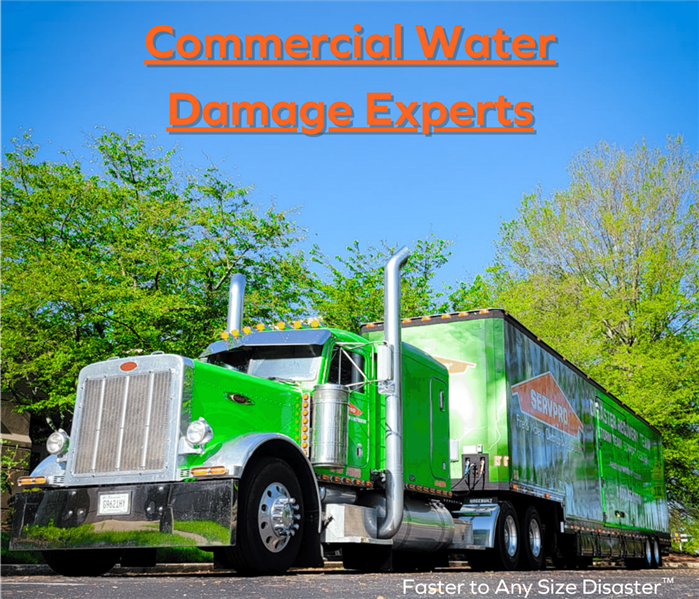 SERVPRO of North Atlanta is ready for whatever happens! We'll restore your business after any size of property damage.
SERVPRO of North Atlanta is ready for whatever happens! We'll restore your business after any size of property damage.
Commercial properties present unique risks when it comes to water damage. Unlike residential homes, which are usually one story and have easily accessible crawl spaces and attics, commercial buildings can be many stories high with flat roofs and multiple storefront windows. They also often have expensive specialized equipment that can be very costly to repair or replace if damaged by water. In this blog post, we will discuss the different parts of a commercial building that are at risk for water damage, as well as some tips on how to prevent it.
Plumbing Systems
The first and most obvious risk for water damage in a commercial property is the plumbing system. Because commercial buildings have more bathrooms, kitchens, and other water-using fixtures, they also have larger and more complex plumbing systems. These systems are often located in hard-to-reach places, making them difficult to repair if they spring a leak.
One of the main water damage challenges according to The Hartford Insurance is an improperly maintained sprinkler system. By law, most commercial buildings must have a fire sprinkler system, but many building owners forget to regularly maintain and test these systems. While a well-maintained fire sprinkler system can help prevent extensive fire damage in the event of a fire, improper maintenance or disaster planning can cause extensive water damage that can flood multiple floors.
Another plumbing risk is burst pipes. Commercial buildings, especially high rises tend to run at a higher pressure than residential buildings. Therefore, a burst pipe has the potential to release significantly more water than a home.
One of the ways in which we help commercial property owners prevent catastrophic property damage before it happens is through our app-based Emergency Response Planning program (ERP).
Roofing Systems
In addition to the plumbing system, there are a number of exterior commercial building components that can experience water damage. One of the most common is the flat roof. Because flat roofs are not sloped like traditional pitched roofs, they tend to pool water instead of shedding it. This can lead to leaks and eventually, if left unaddressed, major water damage.
Some common commercial roofing systems include:
- Built-up Roofing (BUR): Often called tar and gravel roofs, these commercial roofing systems are built with a semi-continuous membrane installed in layers, then covered in aggregate. While they are usually simple to maintain, best practices suggest inspecting the roof for deterioration and possible leak points at least twice yearly.
- Thermoplastic Single-Ply Membrane Roofing (PVC & TPO): These roofs are installed in large rolls that are then welded together at the seams with heat. The material is very durable and oil-resistant. However, the heat-welding methods require skilled installation, which can lead to weak points and leak-prone areas if not performed correctly.
- EPDM Roofing: Some roofers call these "rubber roofs" because the material they are made of, ethylene propylene diene monomer is very rubber-like. This kind of roof is derived from oil and natural gas, and appears dark gray or black. When installed correctly and with the highest thickness available, this type of commercial roof will last a very long time with little to no issues. Unless you experience storm damage in your area, an annual check for leaks around the roof penetrations should suffice.
Window Systems
Commercial window systems are built for durability and use, however, they can often present a unique water damage challenge for commercial facilities. Most aluminum glazing systems aren't intended to be 100% waterproof. Most commercial window systems are meant to limit water penetration during extreme circumstances while also weeping water back out to the exterior.
By directing all moisture to the sill flashing, storefront systems limit water penetration. It's critical that the sill flashing be installed correctly in order to avoid water damage. Making sure that sealant is put on the top of the rear leg before installing the sill is one of the most important aspects of a good installation.
The most essential aspect of maintaining water penetration with a storefront is end dam fastening and sealing. Water will enter the building through the jamb locations if end dams are not properly fastened and sealed. Improperly (or missing) end dams can cause significant water damage to the interior drywall or flooring around commercial storefront windows.
Like anything else in a building, time and the elements can cause wear and tear and failure of these commercial window water control systems.
Commercial Water Damage Inspection Services
So if you notice moisture or water damage around your storefront windows, you should consider calling SERVPRO of North Atlanta to inspect for potential water damage issues. Our technicians are trained to identify, troubleshoot, and restore all types of commercial water issues.
Call today to schedule your commercial service!
(404) 261-2925
Fire Hazards in Commercial Office Buildings and Tips to Prevent Them
12/23/2021 (Permalink)
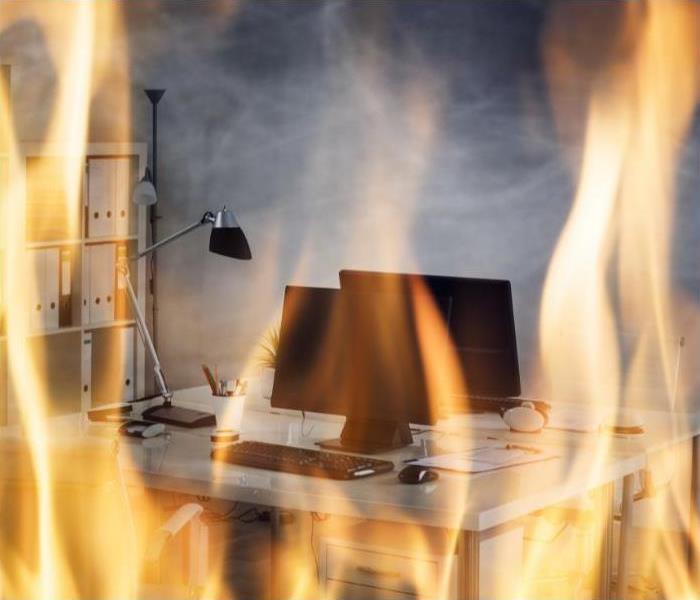 Office Fire
Office Fire
Our homes and our businesses in Atlanta or Buckhead are our castles, which is why we work hard to make them as safe and secure as possible. Unfortunately, there are some hazards that may not be obvious and can cause damage to your office, in the form of fire or water damage. Even more unfortunate? The cost of these damages, which could run into the thousands of dollars, and can come out of your pocket—whether you’re an individual homeowner or a business owner or landlord. Here are some common causes of fire and water damage in commercial office buildings, as well as tips on how to prevent them from occurring and damaging your home or commercial property.
Understanding Building Fire Damage
Most office building fires are small. But even a small fire can do a lot of damage if it gets out of control or isn’t contained early on. One of the biggest dangers is smoke and fire damage to your home or commercial office's interiors. Smoke can permeate materials, carpets, walls, flooring, ceilings—even drywall joints—leaving hidden danger behind long after flames have been extinguished. Even if you can’t see any visible signs of fire or smoke damage, you should always have an experienced professional examine your property for lingering toxins from before you move back in.
According to this report by the NFPA, there are 7 main causes of fires in commercial office buildings. Cooking Equipment, Electrical distribution and lighting equipment, heating equipment, intentional damage, smoking materials, exposure to other fire sources, and electronic, office, or entertainment equipment. This statistic includes general business offices, banks, veterinary or research offices, engineering, mailing firms, and post offices.
Common Causes of Commercial Building Fires
Most office fires are caused by cooking equipment, accounting for slightly over one in every four commercial office fires. However, while these fires are the most common, they do not account for most of the property damage to office buildings. That position is taken by the intentional damage category. Intentional damage alone accounts for a full 20% of commercial fire property damage. Intentional Property Damage occurs when a person seeks to purposely damage the office property through arson.
Two other leading causes of fire in office buildings are heating equipment, electrical distribution, and lighting equipment. Together, they account for 18% of property damage to commercial office buildings. These can include things such as space heaters, light fixtures, electrical wiring, outlets, electrical appliances, extension cords, and more.
While lower on the list, smoking materials, electronic, office, or entertainment equipment account for 12% of commercial office property damage.
Lastly, exposure fires, as defined by the National Fire Incident Reporting System (NFIRS), are fires resulting from another fire outside of the commercial building itself. This kind of commercial fire damage accounted for 18% of property loss.
What Can I Do To Prevent A Building Fire?
If your building was constructed with modern building materials, fire damage should be a rare occurrence. But it can still happen if you’re not careful. Make sure all smoking materials are safely extinguished before leaving work each day. A smoldering cigarette can ignite more easily than you think. Also, make sure to regularly inspect your smoke alarms, carbon monoxide detectors, and fire suppression systems to ensure they’re working properly. If a smoke alarm goes off for no reason at all, make sure to replace or recharge its batteries immediately.
The NFPA uncovered another intriguing statistic about fires on weekends and between the nighttime hours of 7 pm and 7 am. 19% of fires occurred on weekends but accounted for 31% of fire-related property losses. Meanwhile, fires at night accounted for less than one-third of office property fires, yet caused 67% of direct property damage due to fires.
Automatic Fire Detection & Fire Extinguishing Systems:This shows that one of the most important steps you can take towards protecting your office building from fire damage is to install and maintain automatic detection and fire extinguishing systems.
Camera monitoring systems such as those installed by videosurveillance.com or Pelco would be best for large-scale commercial properties. Otherwise, self-installed solutions such as those recommended in this article by PC Mag will work well.
For fire suppression systems, the best solution is to pay a proper fire protection services consultant such as Fire Protection Services LLC. Make sure to ask them to help you develop and implement a fire suppression system maintenance plan.
Cooking Equipment Fire Prevention: The best way to prevent fires with cooking equipment is to train your staff properly in its use, cleaning, and maintenance. For more on cooking equipment fire prevention, be sure to refer to our article on reducing the risk of commercial kitchen fires here.
When it comes to electrical distribution and lighting equipment, there is a multitude of reasons why fire may start. But according to this article by firerescue1.com, faulty outlets or appliances, light fixtures, extension cords, space heaters, and wiring issues were the 5 most common electrical fire causes.
Electrical Hazards Fire Prevention: To prevent faulty outlet or wiring fire hazards, the first step is to make sure to have a certified electrical contractor or property inspector review your commercial property before purchase. Even if you or a tenant are already occupying your commercial office space, a proper inspection by a certified electrical contractor to ensure code compliance of all building materials and installations will protect you from potentially expensive fire repairs. This is especially important to protect you from having to pay for potential property damages out of pocket.
To protect your commercial property from fire damage due to light fixtures or extension cords, the most important tip is to ensure you follow the manufacturer's maximum recommended wattage and amperage guidance.
A good rule of thumb for selecting an extension cord is the smaller the wire gauge rating, the greater the capacity. According to this article by the Spruce, 12-gauge extension cords can handle up to 1920 watts (16 Amps), 14-gauge cords can handle 1440 watts (12 Amps), 16-gauge can handle 840 Watts (7 Amps), and 18-gauge cords 600 Watts (5 Amps). In addition to wattage capacities, another thing you should look at when choosing a commercial electrical power solution is cord lengths. The longer the cord, the more important it becomes to have a higher wattage extension cord.
For light fixtures, you should follow manufacturer guidelines to prevent property fire damage. However, what you should look out for are potentially dangerous light bulb wattages and materials around your lighting fixtures that could catch fire. High-wattage incandescent bulbs installed on light fixtures that are rated for lower-wattage bulbs can spark flames because of overheating. Also, keeping flammable materials around light fixtures, or allowing dust buildup increases the risk for fire damage.
Call SERVPRO of North Atlanta to Restore Commercial Fire Damage
We hope these tips are useful to help you protect your commercial property from fire damage. In case you experience a property loss in your commercial office building or commercial property, our team at SERVPRO of North Atlanta is available to help 24/7/365. Call us today at 404-261-2925 for rapid assistance.
Accidental Fire Sprinkler Discharge
12/23/2021 (Permalink)
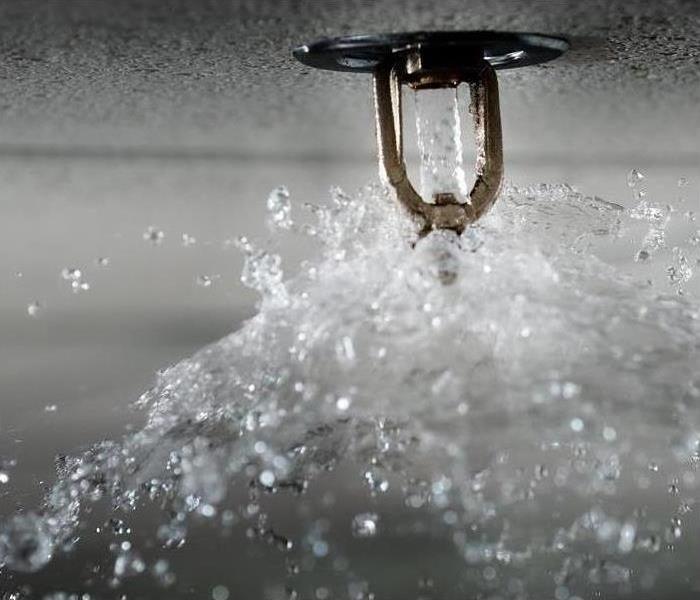 The accidental discharge of a fire sprinkler can cause devastating levels of damage.
The accidental discharge of a fire sprinkler can cause devastating levels of damage.
Fire Sprinkler Discharge
In 20 minutes, a single fire sprinkler can spray hundreds of gallons of water onto a fire or just onto your most important documents and equipment, flooding the office. It’s certainly not action movie common in Sandy Springs, GA, but overhead sprinklers do get discharged when fire is not involved. If it happens to you, take these steps:
1. Turn Off the Water Fast
This seems simple, but it may require planning. First, if you are the responsible party working at a property, you need to know where the water shut off is. That is information you should find out ahead of time, especially if you or others working on the property are working near the sprinklers or carrying items that could hit a sprinkler.
Secondly, if you have employees working at your property, they need two things: an emergency plan that includes detection of accidentally discharged fire sprinklers and knowledge of the location of the water shut off valve. This is particularly important if you are not regularly onsite. If your employees wait for the fire department to handle the sprinklers, the flooding could be extensive.
2. Call Your Insurance Company
It may be tempting to wander into the wetness and start deciding what’s what, but it will probably save time in the long run if you let your insurance company make decisions and follow its directions. It'll most likely want to investigate the situation without any extra considerations. If there is something you want to do before someone from your insurance company arrives, just check with your insurer ahead of time.
3. Hire Restoration Services
You should have approval from your insurance company before you choose a water damage restoration company. A quality restoration job will put your property back together like the water damage never happened.
The accidental discharge of a fire sprinkler can cause devastating levels of damage. However, the faster the sprinkler gets turned off, the less flooding and other damage there will be. Following the directions that your insurance company gives you will help you get back in business in a dry and restored office.
What Should You Do to Reduce the Risk of a Commercial Kitchen Fire from your Cooking Systems?
11/29/2021 (Permalink)
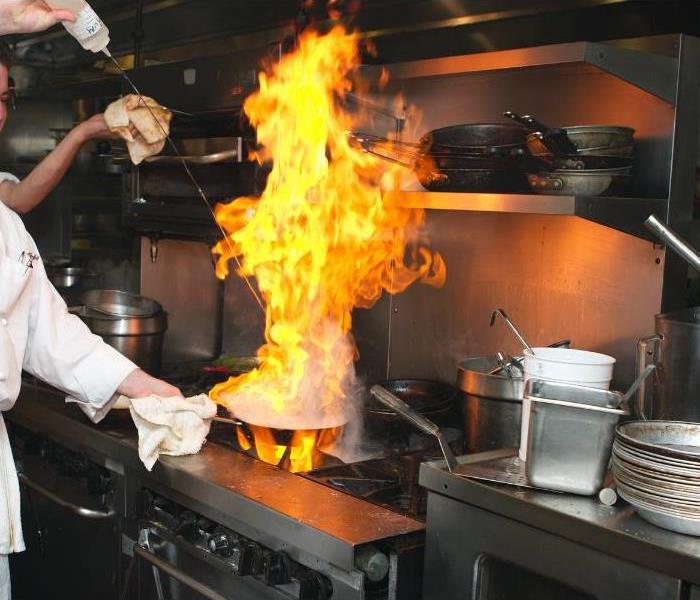 Commercial Kitchen Fire While Cooking
Commercial Kitchen Fire While Cooking
Attention all restaurant and bar owners in North Atlanta & Buckhead: The National Fire Protection Association (NFPA) reports that fire departments responded to over 7,410 structure fires in the kitchen of restaurants and bars in 2017 alone. The majority of these fires were preventable, resulting in three deaths, 110 injuries, and $165 million in property damage annually in commercial kitchens. Not only do kitchen fires threaten the lives of staff and patrons, but they also put restaurants at risk of being shut down due to fire code violations when repairs are needed after a blaze.
What Are My Ducting and Air Movement Requirements to Prevent Fire?
While Chapter 7 of the NFPA 96 Standard for Ventilation Control and Fire Protection of Commercial Cooking Operations covers this extensively, here are a few key items to keep in mind.
First, commercial kitchen ducts should never pass through firewalls, share an exhaust system with the building ventilation, or have obstructed access panels. While doing these things on a commercial kitchen remodel can save costs in the short term, the fire risk increases significantly. If disregarded, your commercial kitchen work will likely not pass inspection.
Make sure to maintain a minimum clearance of 18 inches between combustible materials and the kitchen ducts. This standard is based on Section 4.2 of the NFPA 96, however is one of the easiest to disregard once the kitchen is operational. Ducts can build up high levels of radiant heat that can ignite combustible materials like boxes, cups, plates, utensils, or other kitchen materials.
If you would like additional information on the types of combustible and non-combustible materials that should and shouldn't be kept near the duct, consult Chapter 3 of the NFPA.
What Are My Commercial Kitchen Fire Extinguisher Requirements?
"The NFPA 96 requires automated fire suppression equipment for all grease removal devices, hood exhaust plenums, and exhaust duct systems in a commercial kitchen, as well as any cooking equipment that produces grease-laden vapors." - Koorsen Fire & Security
The NFPA 96 requires use of class K fire extinguishers in conjunction with automatic fire extinguishing systems. These extinguishers also require installed placards stating their extinguisher class. However, in the case of a commercial kitchen fire, it's critical to activate the automatic fire extinguisher system before using portable-type extinguishers. This is because high-efficiency cooking appliances in many modern commercial kitchens are capable of achieving high temperatures that can raise the vegetable oils to intensely high temperatures. When oil ignites at these high temperatures, it can already be so hot that a portable extinguisher is not enough to stop the flames.
Another standard that you should familiarize yourself with is the UL 300 standard.
According to this article by Insureon, a kitchen’s cooking equipment must meet these UL 300 requirements:
- Fire-extinguishing nozzles in the hood, ducts, and above each cooking appliance
- An automatic fuel shut-off capabilities for both gas and electric power sources
- A manual fuel shut-off pull for all power sources
- A wet-chemical fire-extinguishing system that meets UL 300 criteria (one of which is undergoing semiannual checkups by a certified professional)
Practice Proper Maintenance & Inspection in Your Commercial Facility
The first step towards proper maintenance to prevent a commercial kitchen fire in your facility is to create a regular plan for inspections. While you can do these yourself, it is often a good idea to consider outsourcing this service to a proper NICET Certified Fire Inspector. Depending on the volume of cooking in your commercial kitchen, they will likely recommend monthly, quarterly, or annual inspections to ensure compliance and safety.
On regular inspections, fire inspectors will provide the best guidance on where you should focus your team's routine maintenance time and resources. Ultimately, it is up to you as an owner or manager on how closely you implement those recommendations.
Typically, at least the vent, hood, and duct must be cleaned regularly to remove grease vapor and prevent combustible material build-up. Grease Filters should be cleaned at least once per week, and your automatic fire suppression system should be inspected at least every 6 months or as required by your local regulations. Regular cleaning according to equipment specifications should be observed as well.
What To Do If There Is a Fire In My Commercial Kitchen?
If you can, get everyone out safely. If you have an outdoor exit, have people leave that way. Do not open any interior doors or windows or use elevators during a fire. Even if it seems like it’s far away, do not stop to pick up personal belongings. Unless it’s your home, never go back inside during or after a fire. Once you are safe, call 911 immediately and stay on the line until help arrives. Once firefighters arrive on the scene they will assess if there is still a risk for injury within any structure fires before allowing you to re-enter your building.
Next, you should call a fire restoration expert like SERVPRO of North Atlanta to help you quickly restore your commercial kitchen to an operational state.
Our trained technicians are available 24/7/365, and ready to help. We also offer a special Emergency Response Plan to commercial facilities to reduce property damage in the case of an emergency commercial fire event. Call us today at (404) 261-2925 for emergency services or to schedule your free SERVPRO ERP.
How To Maximize Recovery After a Partial Loss
10/27/2021 (Permalink)
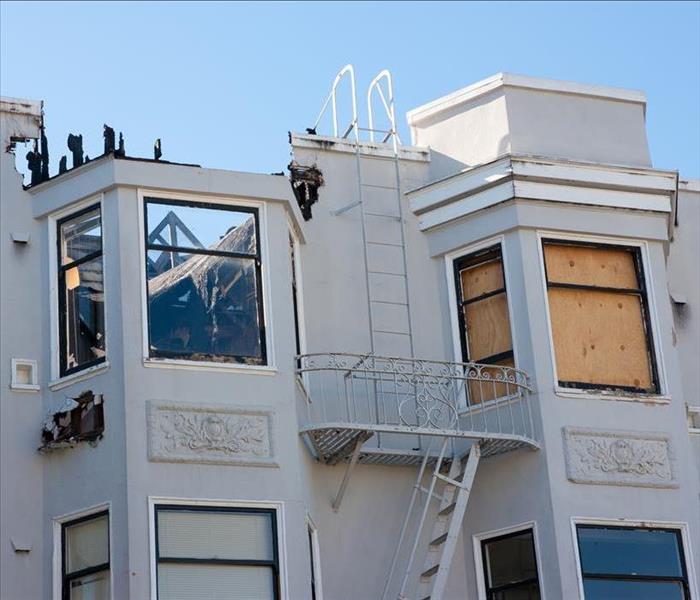 Roof damaged by fire in a building in Buckhead, GA.
Roof damaged by fire in a building in Buckhead, GA.
How to Get the Most Out of Your Recovery After a Partial Loss
A fire can be devastating, both financially and structurally, as it often results in fire, water and smoke damage. Areas of a building not even touched by flames may require cleanup and restoration, and electronics throughout the building may be ruined due to smoke, water and power surges. So, as a business owner, it can be devastating when an insurance company deems one's fire loss a "partial loss". If your insurance company recently returned a partial loss verdict, it's understandable if you're feeling frustrated and unsure of what to do. However, don't let your frustration get the better of you; instead, take the following steps to maximize your recovery and get your business back off the ground:
• Call in a Buckhead, GA, fire restoration team to perform a thorough inspection and document damage.
• Document everything that was damaged or destroyed, even if you're not sure it's worth documenting.
• Check for mold, smoke, soot and other irritants.
Request a Thorough Inspection
Most insurance adjusters won't accept a fire loss claim without the findings of a thorough inspection. This means that you cannot just assess the damage yourself, mark stuff down and send in a claim. You must call in a licensed contractor who can walk through your building and inspect the roof, structure, siding, windows, insulation and plumbing, and HVAC systems. The contractor can provide an official report that itemizes damages and losses.
Document Losses
While a professional fire cleanup team can assess your building for structural damage, they likely won't know how to categorize your more personal losses, such as equipment loss, data loss and damage to confidential documentation. Do this yourself to ensure that you are covered for everything.
Check for Irritants
Most insurance companies are required to cover mold, smoke, or soot restoration, so long as the damage was from the recent disaster. Have your inspector check for any irritants so that you can request remediation.
If all else fails, claim unreimbursed losses on your tax return. However, a thorough inspection, detailed documentation, and present irritants may be all you need to maximize recovery for fire loss.
The Basics of Mold Remediation
7/26/2021 (Permalink)
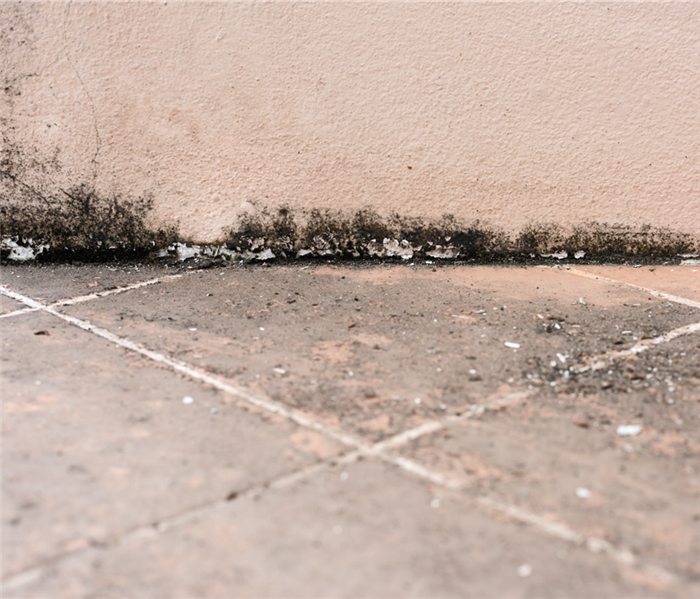 Black mold damage in Virginia Highlands, GA.
Black mold damage in Virginia Highlands, GA.
If you have noticed black mold in your business in Virginia Highlands, GA, you need to act quickly and begin mold remediation as soon as possible. If left untreated, mold can spread quickly through a building. You may want to hire experienced professionals to do the job to ensure that all of the mold is removed properly. It is important to make sure that every step of the remediation process is followed to prevent the mold from reappearing.
The Mold Remediation Process
The experts should follow these basic steps:
• Inspect the property to determine where the black mold is and how severe the damage is
• Contain the mold to prevent it from spreading anywhere else
• Filter the air with specialized equipment to capture tiny mold spores in the air
• Use antifungal and antimicrobial treatments to remove mold and prevent regrowth
• Dispose of mold-infested materials
• Clean and sanitize items such as furniture, carpet, and decorative items
• Restore any building materials that were damaged or removed during the mold removal process
Preventing Black Mold in the Future
Once the mold clean-up is complete and your building is back in shape, there may still be work to do. Unless you eliminate the problem that caused the mold in the first place, you run the risk of mold growing right back where it was. If your mold professionals identified the cause of the mold, you’ll want to deal with it as quickly as possible. Potential causes of mold include leaky roofs, windows, and pipes, flooding, and high humidity levels. Speak to your mold professionals to determine the best plan of action for you and your business.
Mold cleanup can be a time-consuming and expensive process. The key to minimizing damage is fast action. Take the time to make sure mold is removed correctly and you will save time in the future instead of dealing with it on a regular basis.
Hail Can Make Commercial Property Frail
6/25/2021 (Permalink)
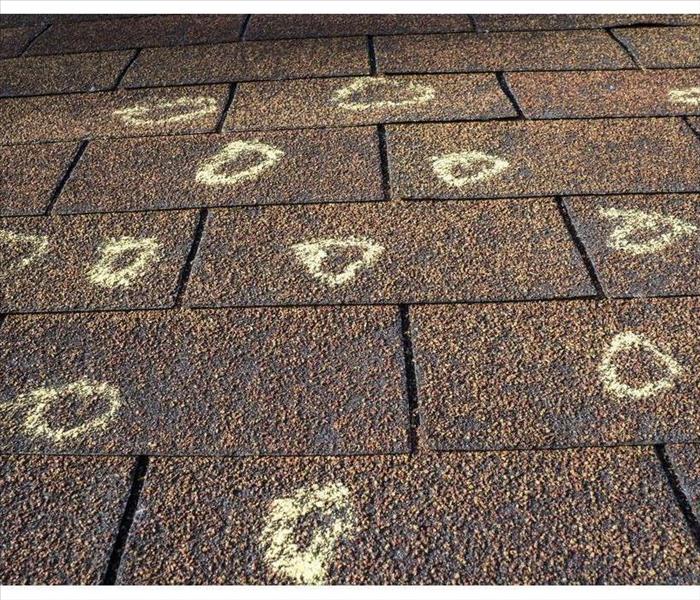 Hail damage to roof.
Hail damage to roof.
Hail has varying effects on property depending on conditions at the time. Even if the hailstorm isn’t severe, long-term exposure to multiple impacts will damage the exterior of commercial property and require repairs for roof damage and other structural harm.
Understand Hail’s Variance
Just like any other natural event, there are a few different contributing factors to the damage each unique hailstorm can cause:
- Wind direction and speed can direct hail to hit vulnerable spots at high speeds
- Hailstones vary from pea-sized to the size of a baseball with different forces of impact
- Different materials absorb the impact differently, such as aluminum denting easily
- Coverage from nearby buildings or trees can absorb impact from certain directions
Know What Hail Damage Looks Like
Depending on the type of shingles and the storm, hail damage will look different when you inspect it. If your business has asphalt shingles, the roof should be evaluated for black-colored spots or missing shingle granules. Any fresh roof damage will be apparent following a storm since the substrate layer has no exposure to the sun and will shine brightly.
Wood shingles show damage differently. The shingles will appear split or sharp on the edge. They may also be a dark orange color or have visible impact marks. The cracking in wood makes it more visibly harmed than asphalt.
Prepare for Repairs and Water Damage Cleanup
Regardless of the type, water damage coming from the roof is the most revealing sign of roof problems. This can be ruined insulation in the attic or water seeping into the property. Repairing the roof as soon as possible to prevent further water damage is highly advised to prevent water damage.
Water damage becomes worse as it sits and deteriorates either, so reaching out to a professional storm cleanup crew can salvage damaged capital. Hail in Ridgeview Park, GA, is a threat regardless of how severe a storm. Keeping up proper maintenance and upkeep by understanding hail helps stop roof damage from becoming much worse.
3 Challenges Posed By Commercial Smoke Damage
4/19/2021 (Permalink)
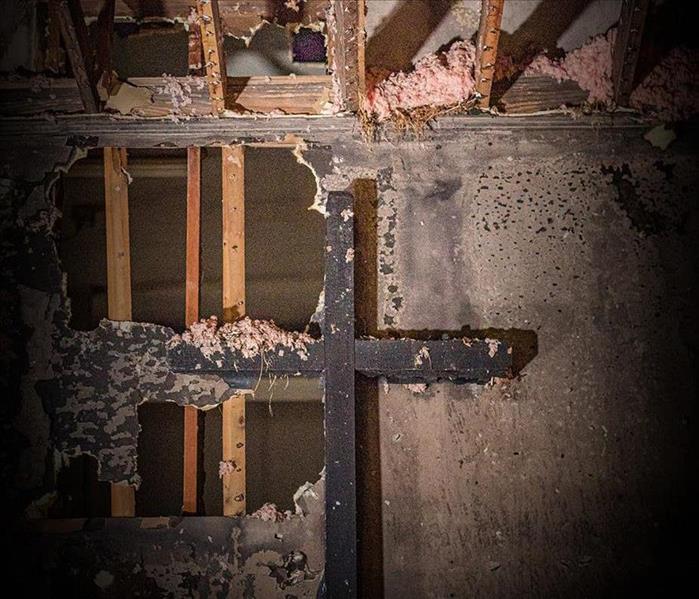 Fire event damaged structure to a building in Atlanta, GA.
Fire event damaged structure to a building in Atlanta, GA.
Commercial Smoke Damage
Smoke damage can be one of the most lasting consequences of a fire that has occurred in or near a commercial building in Atlanta, GA. Specialized smoke cleanup solutions and equipment are essential for getting rid of this odor, as is awareness of the many ways in which smoke odor molecules can stick around for weeks or months after a fire.
1. A Coating of Smoke Residue on Surfaces
Smoke residue can build up on fixtures, furniture, walls and floors in a commercial location. This sticky coating may be present throughout a structure that has experienced a fire, even in areas that were not directly exposed to open flames. While vacuuming may be able to eliminate soot damage, this resinous coating calls for the use of specialized solvents.
2. Smoke Odor Lingering In an HVAC System
Aside from the air and visible surfaces inside a building, smoke damage can also spread through the HVAC system. Whether or not this system is in use when a fire breaks out, particles of smoke and soot can find their way into vents and ductwork and spread as soon as the system is turned on unless ductwork has been cleaned.
3. Untreated Contents Posing Recontamination Risks
Any smoke-damaged contents that stay in a structure may prove a source of the persistent smoke odor. For this reason, contents are typically removed from the location of a fire, cleaned off-site using treatments that neutralize smoke odors and stored until the fire restoration is finished.
Smoke cleanup should take place after fire cleanup for a fire that has happened on-site at a commercial structure in Atlanta, GA. It is necessary to eliminate charred materials and soot from a building before treating smoke damage on surfaces or in the air. If smoke odor continues to pose a problem after fire restoration, most commercial property insurance policies also cover smoke cleaning.
Mold Removal Expectations
2/2/2021 (Permalink)
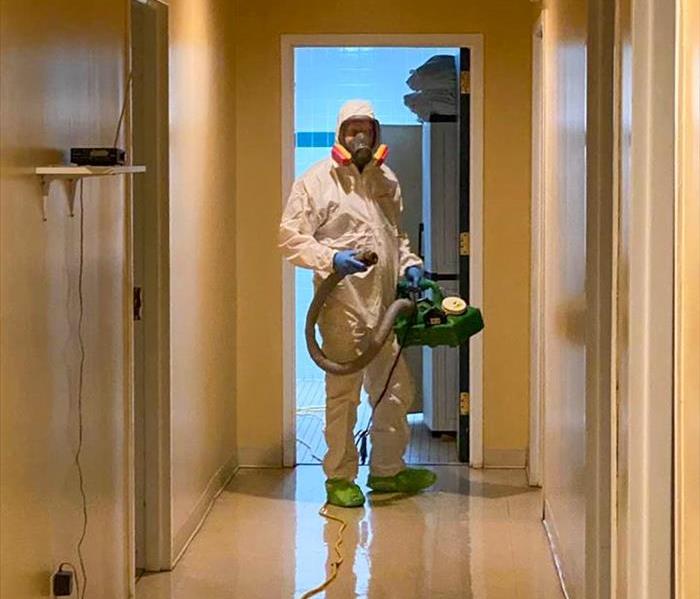 Mold remediation in Atlanta, GA.
Mold remediation in Atlanta, GA.
Finding mold in your Atlanta, GA business is frustrating. As a savvy business owner, you know how vital it is to get the problem taken care of as soon as possible. On the flip side, time is money for continued business success. Understanding the mold removal process and getting the right help are keys to a faster recovery.
The Remediation Process
When it comes to mold growth, every situation is different. In most cases, the remediation process takes three to seven days. Depending on the location and extent of damage, it may require moving operations off-site during the cleanup. Once an inspection and assessment are completed, you can have the following expectations for mold removal:
- Technicians will be outfitted with safety gear, including a face mask, goggles, gloves and protective suit.
- The affected area will be sealed off with a containment barrier, ensuring spores don’t spread to unaffected areas.
- Unsalvageable materials will be removed, such as portions of drywall, insulation and baseboards.
- Surface areas are treated to kill the mold.
- After physical removal, high-tech air scrubbers or other tools are used to clean the air of any potential spores.
- A sealer or encapsulant may be used to increase resistance to black mold and water damage, as well as control odors.
Expertise Matters
Knowing that mold may easily return if not properly taken care of, finding the right help is essential. If the damage is extensive, it's best to find a certified remediation and restoration company. That ensures they are up to date on the latest standards and processes. It is also important to verify that their technicians are also certified. Along with having the tools and techniques needed for cleanup, they will also be able to make any structural repairs.
While mold removal may mean some downtime, not getting it properly taken care of may mean much more downtime in the future.
What to Look for in an Effective Security Fence
12/28/2020 (Permalink)
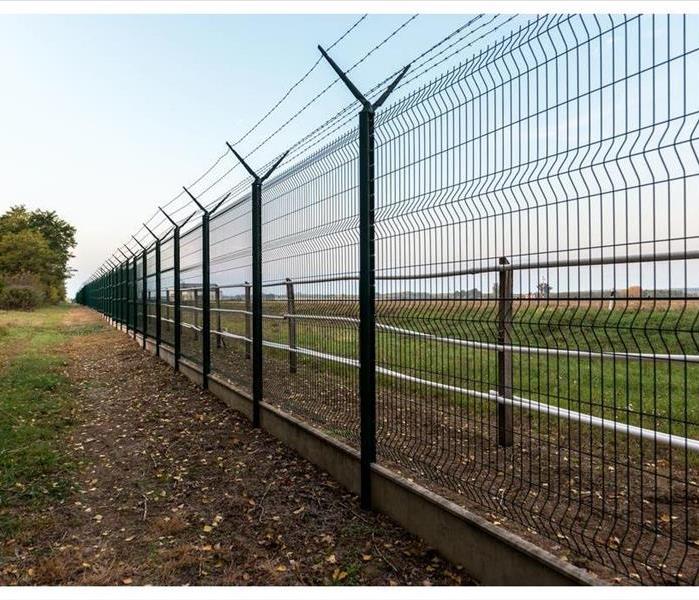 To protect your business, you are going to want an effective security fence
To protect your business, you are going to want an effective security fence
What to Look for in an Effective Security Fence
A lot of companies will install any fence around their property. They think this will keep vandals away from their damaged building until the remediation professionals arrive. However, that is not the case. Some fences can actually appeal to criminals. The best thing to do is to look for several traits that make a security fence effective.
See-Through
Always go with a see-through security fence. This allows people to see inside the lot, deterring criminals. A solid fence will provide cover that can attract vandals.
Hard to Climb
You want a fence that is hard to climb. Here are some things you should look for:
- At least 8 feet tall
- Few horizontal rails
- Spiked top
The height may be obvious as a frighteningly high climb will deter most criminals. However, you may have height restrictions, so you will want to make sure you meet codes before installing one. Avoid horizontal rails since these can work as a ladder for people who want to get onto your property.
As far as a spiked top, there are lots of options. Some fences will have points built into the vertical rails. Others will have a flat top, and you will need to install barbed wire or anti-climb spikes.
Impassable
If a vandal can go through or under your fence in Sandy Springs, GA, it does you no good. To prevent them from going under, you should secure the fence to the ground with concrete. Ideally, you will have the entire bottom secured. In some areas, this may not be possible. In those cases, make sure all the posts are in concrete.
You must also make sure they cannot go through your fence. Opt for heavy-duty metal so it cannot easily be cut through. Also, be sure your gate is just as secure. This is the weakest point in your fence. Therefore, you want to make sure it is made out of the same heavy-duty material as your fence. A padlock can add an extra layer of security.
To protect your business, you are going to want an effective security fence. Looking for these features can help you pick the right one.
3 Steps To Prevent Damage After A Pipe Bursts
12/15/2020 (Permalink)
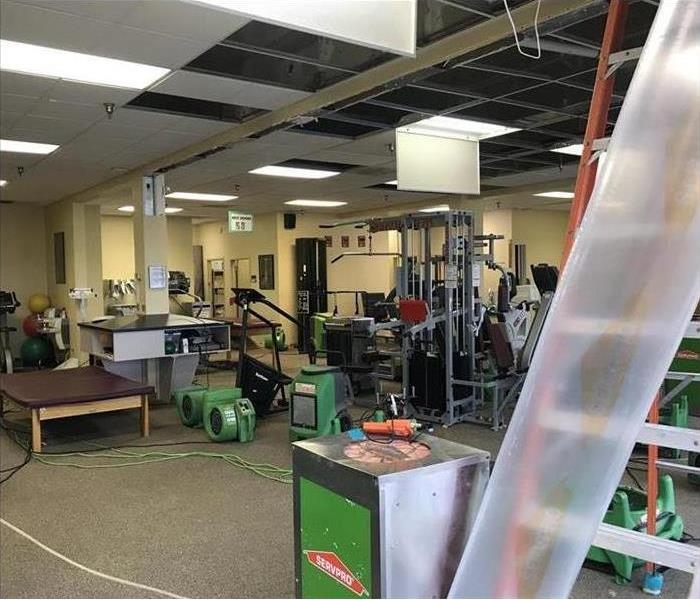 Water damage in Atlanta
Water damage in Atlanta
Steps To Take For Preventing Long-Term Problems
You may be fortunate enough as a business owner in Atlanta, GA, to not have to think about floods as a risk on a regular basis. However, flooding isn't only the result of natural disasters. Bursting pipes are one of the main causes of damage to businesses. Whether a pipe burst due to old age, freezing weather, or hard water buildup, a broken pipe can do real damage.
1. Call For Help
As soon as you can, call a water damage remediation specialist to come and evaluate the problem. Whether a large flood or a small one, water damage can cause long-term problems if it isn't dealt with correctly. Water can permeate all types of materials, allowing mold to grow behind solid drywall. Using a professional to fix broken pipe provides the additional benefit of them being able to assess any damage to the surrounding area.
2. Clean Up Safely
Once you've been told that there are no safety hazards, such as exposed electrical wiring, you can begin to handle some of the cleanup process yourself. Pumps and shop vacuums can be used to remove standing water. If you're able, move furniture and rugs, preferably outdoors, so that they can dry out completely. Running fans or dehumidifiers will help to dry out wet indoor areas and mitigate the spread of mold caused by bursting pipes.
3. Prevent Future Problems
Once you've chosen your remediation team, they will work with you to evaluate the full extent of damage. There exists a technology that enables professionals to check the moisture level behind walls so that you know the potential risk of mold growth without needing to tear down walls to check.
Proper drying and ventilation after water damage from bursting pipes will help to make your business a safe place for you and your employees to work.
4 Tips To Stay Safe During Flood Cleanup
11/11/2020 (Permalink)
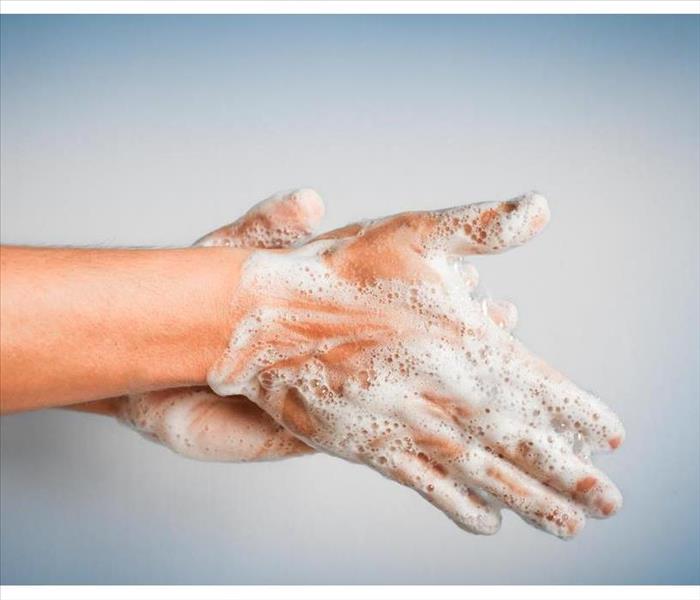 Always wash your hands with soap and water after handling anything that has touched floodwater
Always wash your hands with soap and water after handling anything that has touched floodwater
Follow These Tips To Stay Safe During Flood Cleanup
After a business flood, you’ll likely want to start cleaning up your flooded company as soon as possible, but you should fight the urge to jump in with both feet. Flood situations can pose serious health hazards.
1. Understand the Risk
Even clean-looking floodwater can be highly contaminated. Water from outside contains bacteria and other microorganisms and may be tainted with chemical pollutants. Floodwater from a broken pipe can contain human waste or other organic matter. Even clean water can become contaminated if it touches floors and other areas of your business, or mixes with contaminated water.
2. Call in the Pros
Before attempting any cleanup efforts yourself, call a professional flood damage restoration company in Morningside, GA. These experts have the proper training and equipment to deal with your flooded company quickly and safely. In addition to cleaning up the building, they can restore many contents of your business through freeze-drying, dry cleaning and other methods.
3. Wear Protective Gear
The Centers for Disease Control and Prevention suggest that anyone who is exposed to floodwaters should wear waterproof gloves, rubber boots and goggles to prevent contact with harmful bacteria. The CDC also suggests wearing a splash-proof face shield and liquid-repellent coveralls, if possible. Remove all protective gear and wash your hands thoroughly with soap and water before getting into your car or leaving the site of the flood.
4. Practice Safe Hygiene
Always wash your hands with soap and water after handling anything that has touched floodwater. Never eat, drink, smoke or chew gum during flood cleanup. Wash your hands thoroughly before eating, and before and after using the restroom.
The best practice is to leave flood cleanup to the professionals, who have experience working with potentially contaminated floodwaters. However, if you must enter your flooded company, be sure to take the necessary precautions to keep yourself safe.
4 Things Your Property Insurance Should Cover
8/25/2020 (Permalink)
4 Things Your Property Insurance Should Cover
The commercial building you own in Morningside, GA, is a big investment. It is wise to make sure that it is protected in the event of a fire or some other catastrophe. When you purchase commercial insurance, your package should include a property policy. Here are five things that you should expect such a policy to cover.
1. The Property Itself
Property insurance is designed to pay for fire restoration services for the structures you own that have fire damage. There are several structures it includes:
- Building
- Signs
- Satellite dishes
- Fencing
It also includes damage to the part of the property that you own that surrounds your building. Your landscaping, sidewalks and driveway are also included in the coverage.
2. Manufacturing Equipment and Supplies
If you produce goods in your building, the machines used to do so can get damaged by fire just as easily as the building. You may also lose some of the inventory of completed products in storage or the materials used to make them. If any of these items are in the building and get damaged, the property policy of your commercial insurance package can reimburse you for the loss.
3. Office Equipment and Furniture
During a fire, your furniture, phones, computers and other office equipment can be damaged. Even if it's not burned by the flames, smoke and soot can damage sensitive equipment. The items you and your office employees use every day are protected by your property insurance.
4. Documents and Records
The recovery of important documents may be on your to-do list after a fire. Unless they are completely destroyed, it is likely that restoration experts can restore accounting records, payroll documents and other important items.
The specific policies found in a commercial insurance package may vary slightly from business to business, but any business owner who has property needs a property policy. It covers damage to your building and the important items inside it.
 SERVPRO of North Atlanta is ready for whatever happens! We'll restore your business after any size of property damage.
SERVPRO of North Atlanta is ready for whatever happens! We'll restore your business after any size of property damage.




 24/7 Emergency Service
24/7 Emergency Service










